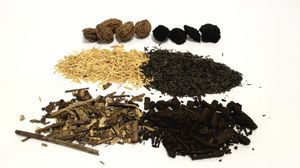Hydrochar
The solid product formed during hydrothermal carbonisation can be deployed in a variety of ways. Feedstock composition and reaction conditions influence the properties of hydrochar. They need to be optimized depending on the field of application.
Hydrochars from residues are mainly used for energy generation (through combustion or gasification). The energetic potential of these chars varies based on the calorific value between 16-30 MJ/kg depending on the feedstock. Besides the improved energy recovery, other process-related advantages come into play especially in the matter of sewage sludge disposal. This includes better drainability of the residual material due to its hydrophobic properties as well as hygienisation. Governmental regulations (waste law) has so far made it difficult to utilize hydrochar as a conventional fuel since feed materials defined as waste remain waste even in the carbonized state and may therefore only be used in incineration plants that inherent adequate permissions.
Besides incineration, hydrochar can be gasified in a subsequent process step. During the gasification, syngas consisting of large parts of carbon monoxide (CO) and hydrogen (H2) as well as parts of methane (CH4) and hydrogen sulfide (H2S) is produced. An energy density increase of the gas can be achieved by methanation of the carbon monoxide. Shifting the reaction conditions also allows for an increased hydrogen production.
Another significant potential of hydrochar is seen in the area of high-performance carbons. Coal obtained from sewage sludge has been successfully upgraded and applied as powdered activated carbon. The adsorption properties were similar to commercially available products. Especially wastewater treatment plants can profit from these results since there is a great on-site need for cleaning of other process streams. Among others, further research focusses on using bio-based chars as carbon black substitute as well as electrode material in so-called "supercapacitors".
Copyright: © Römerscheid, DBFZ
